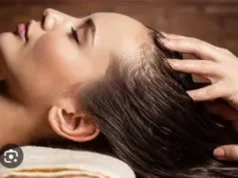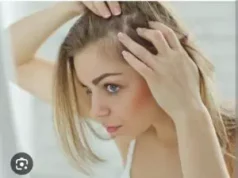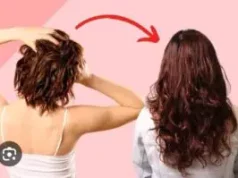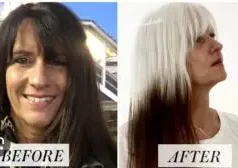You could notice a number of symptoms that your hair is growing longer as your hair grows. But does a scratchy head of hair count? When your hair is growing, does your scalp itch?
Continue reading to get the solution to that and other questions.
We’ll look at whether having an itchy scalp indicates that your hair is developing in this post. In addition, we’ll look at some of the most typical reasons of itchy scalps and show you how to get relief.
Does Your Scalp Itch When Your Hair Is Growing?
Sometimes, itching is an indication of growing new hair. New growth can occasionally result in a tingling or itching sensation, however it’s uncommon. If hair is regrow after hair loss, this is especially true.
New hair strands might penetrate your skin because of their sharp, pointed ends. That may result in pain or itching, which goes away once your hair follicles grow to a particular length
It’s crucial to remember, though, that an itchy scalp is not always an indication of hair growth.
It typically denotes that your scalp is unwell. So, keep an eye out for other symptoms to help you determine whether your itching is due to hair growth.
These might appear in a variety of ways, including as peeling, pimples, an unpleasant odour, or discharge.
Also Read: side effects of Using Clove Water For hair Growth
Why Does My Scalp Itch?
The fact is that nobody desires itchy scalp. All that scratching is distracting and painful, and it can cause substantial hair breakage and loss. You may experience an itchy scalp for a number of reasons. We’ll outline them below.
- Dry Scalp: Lack of moisture in the scalp can lead to itching. Dry air, overwashing, or using harsh shampoos can contribute to this.
- Dandruff: Dandruff is often characterized by flaky, itchy skin on the scalp. It’s typically caused by a fungus and excess oil.
- Psoriasis: Psoriasis is a skin condition that can affect the scalp, leading to red, scaly, and itchy patches.
- Seborrheic Dermatitis: This condition is similar to dandruff and can result in red, itchy, and scaly skin on the scalp.
- Allergies: Some individuals may be allergic to certain hair care products, such as shampoos or conditioners, leading to scalp itching.
- Head Lice: Infestations of head lice can cause intense itching and discomfort.
- Contact Dermatitis: If you’ve had contact with irritants or allergens, it can lead to an itchy scalp.
- Skin Infections: Bacterial or fungal infections of the scalp can cause itching and discomfort.
- Stress: Stress can exacerbate scalp conditions and lead to itching.
To address scalp itching, you can try using a gentle, moisturizing shampoo, avoid overwashing, and keep your hair and scalp clean. If the itching persists or is severe, it’s advisable to consult a dermatologist or healthcare professional to determine the underlying cause and receive appropriate treatment.
Also Read: Can Biotin Cause Headaches? How Much Is Good for Hair Growth
How to Stop an Itchy Scalp
It can be challenging to pin down what is making you uncomfortable. In addition, there are numerous causes of itchy scalps as well as numerous remedies for it.
To relieve and stop an itchy scalp, you can try the following tips:
- Use a Gentle Shampoo: Opt for a mild, sulfate-free shampoo that is designed for your hair type. Harsh shampoos can strip the scalp of natural oils and lead to dryness and itching.
- Avoid Overwashing: Washing your hair too frequently can dry out the scalp. Try to wash it every few days or as needed.
- Use a Moisturizing Conditioner: Apply conditioner to your hair to help keep your scalp and hair moisturized.
- Stay Hydrated: Proper hydration can help maintain the overall health of your skin and scalp.
- Avoid Hot Water: Wash your hair with lukewarm water, as hot water can exacerbate dryness.
- Limit Hair Products: Reduce the use of hair styling products, especially those that contain alcohol or other potential irritants.
- Manage Stress: Stress can worsen itching, so practice stress-reduction techniques like meditation or yoga.
- Check for Allergies: If you suspect allergies to hair care products, switch to hypoallergenic or fragrance-free options.
- Use a Scalp Treatment: Over-the-counter scalp treatments or shampoos with ingredients like tea tree oil or coal tar can help with certain scalp conditions like dandruff.
- Consult a Dermatologist: If the itching persists or is severe, it’s a good idea to see a dermatologist who can diagnose the underlying cause and recommend appropriate treatment.
Remember that the cause of an itchy scalp can vary, so the effectiveness of these remedies may depend on the specific issue you’re facing. If the itching is persistent or accompanied by other concerning symptoms, seeking professional advice is the best course of action.
When Should You Get in Touch with a Pro?
For the majority of people, home remedies will be sufficient to calm an inflamed scalp. They may, however, occasionally need expert assistance. Dermatological diseases including scalp psoriasis, ringworm, or seborrheic dermatitis are characterised by itching as their main symptom.






